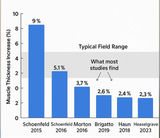Should we keep trusting exercise science?
>>76269335
>Anonymous 06/17/25(Tue)06:04:00 No.76269335▶
>>>76269038 (OP) (OP)
>No but what does your picture mean? Differences between training protocols used in studies?
prolly if u're versed in this shit u will notice immediately glaring mistake/lie in it, not in a mood to dig out what bullshit is it now
u said bot that walking uphill does calves and i didn't believe u one bit
after many iterations of calf raises i tried i have stumbled upon heelhook movement in climbing and my calves never stopped growing ever since - i hook powerband on toes and corss my legs standing and bend back knee while ankle is already fully bent - cause gastrocnemius bends ankle AND KNEE at the same time, it doesn't extend knee like in calf raises
so would u believe that i overdid this isometric hold yesterday? takes trial and error to dial down intensity, there's also ankle sideways movement i am experimenting, but alas - amred with doms on gastrocnemius/calves i have started my day as usual and would u believe this shit? calves hurt ONLY when walking down stairs, not up, not on flat down stairs lol
why is that? no, u can't dispute anything u're only allowed to provide viable explanation as to why walking down stairs DOES CALF and walking up stairs DOESN'T
>Anonymous 06/17/25(Tue)06:04:00 No.76269335▶
>>>76269038 (OP) (OP)
>No but what does your picture mean? Differences between training protocols used in studies?
prolly if u're versed in this shit u will notice immediately glaring mistake/lie in it, not in a mood to dig out what bullshit is it now
u said bot that walking uphill does calves and i didn't believe u one bit
after many iterations of calf raises i tried i have stumbled upon heelhook movement in climbing and my calves never stopped growing ever since - i hook powerband on toes and corss my legs standing and bend back knee while ankle is already fully bent - cause gastrocnemius bends ankle AND KNEE at the same time, it doesn't extend knee like in calf raises
so would u believe that i overdid this isometric hold yesterday? takes trial and error to dial down intensity, there's also ankle sideways movement i am experimenting, but alas - amred with doms on gastrocnemius/calves i have started my day as usual and would u believe this shit? calves hurt ONLY when walking down stairs, not up, not on flat down stairs lol
why is that? no, u can't dispute anything u're only allowed to provide viable explanation as to why walking down stairs DOES CALF and walking up stairs DOESN'T

